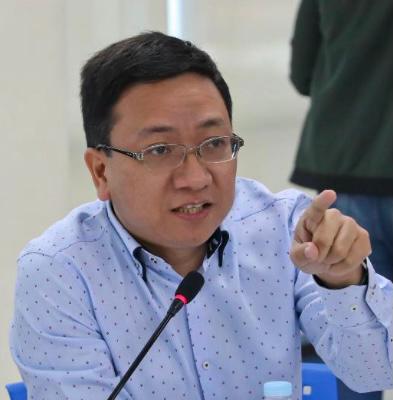
DILG Usec. Jonathan Malaya. File photo from DILG
MANILA, Philippines — The proposed economic Charter change remains to be a priority of the executive branch despite it was not mentioned in President Rodrigo Duterte’s final State of the Nation Address (Sona), Department of the Interior and Local Government (DILG) Undersecretary Jonathan Malaya said Tuesday.
“Hindi ko rin alam kung bakit hindi nabanggit ng ating Pangulo [I really don’t know why the President did not mention it]…What is clear to us in the IATF-CORE (Inter-Agency Task Force on Constitutional Reform) is that this is a priority of the executive branch,” Malaya said in an online briefing.
“While we are proposing these three economic bills, these are the short-term bills that we need to pass but para makumpleto yung [to complete the] package of reforms and to ensure our long term economic recovery and development, we need this economic Cha-cha,” he added.
Malaya was referring to the proposed Foreign Investment Act and the proposed measures amending the Public Service Act (PSA) and the Retail Trade Liberalization Act.
House committee on constitutional amendments chair Alfredo Garbin Jr., for his part, surmised that the President may not have mentioned the economic Cha-cha in his Sona since such legislation is not subject to the Chief Executive’s signature but to the approval of the Filipino people through a plebiscite.
“Proposing amendments to the Constitution is not an ordinary legislation. This is a legislation by the Filipino people. Kami ay nagpo-propose lang, at the end of the day, yung mga Pilipino, ang maga-approve dito,” Garbin said.
(Proposing amendments to the Constitution is not an ordinary legislation. This is a legislation by the Filipino people. We are just making a proposal, at the end of the day, it is the Filipino people who will approve this.)
“This one will not be signed by the President. So, siguro, yun yung aking take doon, kung ano yung priority at dadaan sa kanyang opisina, yun lang yung kanyang na-mention,” he added.
(This one will not be signed by the President. So I think that is my take on that, the President only mentioned the priority measures that will be brought to his office.)
Malaya agreed with Garbin as he underscored the need to pass the economic Cha-cha, saying the three measures he mentioned will not provide long-term economic growth for the country.
“Yung amendments kasi ng ating mga batas like the amendments for example of the Public Service Act, hirap na hirap ang Kongreso na i-redefine ang public utilities, for example, because the Constitution prohibits it,” Malaya explained.
(The amendments of the law, for example, to the Public Service Act, Congress is struggling to redefine public utilities, for example, because the Constitution prohibits it.)
“So kahit amyendahan mo yung mga maliliit na bills, if the mother law…prohibits certain items, hindi po yan maku-cure ng any legislation,” he added.
(So even if you amend these small bills, if the mother law…prohibits certain items, it will not be cured by legislation.)
“Kaya kailangan natin yung tinatawag na systemic reform,” he added.
(So we need to have systemic reform.)
For any systematic reform to happen, the “fundamental law of the land” should be amended, he stressed.
“Kasi isipin niyo na lang yung position ng ating Kongreso, gusto nilang damihan yung mga public utilities na pwedeng pumasok ang mga namumuhunang dayuhan ngunit it may be questioned in court if the fundamental law of the land is not changed because legislation is bound by the limits of the Constitution,” he said.
(If you think about the position our Congress is in, they want to increase the public utilities wherein foreign investors are allowed but it may be questioned in court if the fundamental law of the land is not changed because legislation is bound by the limits of the Constitution.)
“Yun po yung mga problemang kinahaharap natin [Those are the problems that we are facing] that is why the position of IATF-CORE…is it must be a package of reforms to ensure our long-term economic growth,” he added.
In the same briefing, Malaya also called on the Senate to tackle the proposed economic Cha-cha before the period of filing of certificate of candidacy (COC) for the 2022 elections in October.
The House of Representatives has already approved the proposed Resolution of Both Houses No. 2 which seeks to amend the “restrictive” economic provisions of the 1987 Constitution.
The Senate, however, needs to approve the resolution in order for the economic Cha-cha to proceed.

